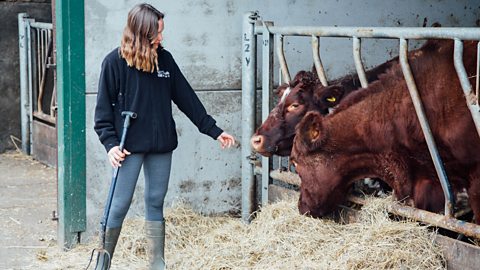Meet Jade, 20, from Cumbria, to find out more about life as an apprentice conservation officer. Part of the Bitesize world of work series.
Hi, I'm Jade. I'm 20 years old and I'm an apprentice conservation officer.
After finishing my GCSEs and A-levels, I decided I didn't really know what to do and the best thing was to just work for a few years, try and figure it out and do a little bit of travelling. So, after a couple of years of working full-time and travelling around Europe, I decided that I wanted to get back into education. I knew that I was very passionate about the environment and so I started looking into different college courses and apprenticeship options for working in the environmental sector. Thankfully, I was lucky enough to find an apprenticeship as a conservation officer and so I applied for it and did as much research as I could. I've got the job and I am now living the dream.
Conservation is protecting the natural environment and trying to make it thrive and flourish as much as possible. Being an apprentice conservation officer, my job really is to try and get as many people engaged in nature as possible and doing an apprenticeship like this, which is so diverse, really means that I can try every different area of this job out and see which fits me the best. And it means that I also get paid at the same time. My favourite part of the job so far is definitely the grey seal surveys. We often take volunteers with us and when we get there, we get all of our protective equipment on such as our outdoor waterproofs, really get wrapped up and warm, and we get our knee pads and everything on for when we crawl across the shingle. And then we walk towards them and, when we get a little bit closer, we slowly crouch down so they can't see us, and then we'll resort to being on our hands and knees and crawling across. It's not very elegant, however it minimises disturbance as much as possible. I've always been a massive animal lover. I love being so close to them and observing the behaviours and I love the enthusiasm, which all the different volunteers show when I take them and teach them the difference surveying techniques. Being able to observe their behaviours in real time is just incredible.
Having suffered with anxiety for quite a few years now, this job has helped me immensely from day-to-day stress and anxiety, to just general happiness, I'm in such a better place because of it. I'm working with so many amazing supportive people and I really couldn't be happier right now.
Being an apprentice, I have all the opportunities available to me if I put in the work and that is so rewarding. I get to work with the most amazing people and in the most beautiful surroundings and I couldn't be happier.
Being able to observe the behaviours of animals in their natural environment is incredible.
- Jade's apprenticeship focuses on protecting the environment, helping it to thrive as much as possible
- The apprenticeship allows her to earn money whilst learning
- She works in many different areas and this is helping her to find what she would like to focus on in the future
- Her favourite part so far is doing a survey of seals!



When Jade finishes her apprenticeship, she will be a conservation officer. A role similar to Jade's is a countryside officer. Countryside officers manage, protect and improve the rural environment.
What to expect if you want to be a countryside officer
- Countryside officer average salary: £19,000 to £34,000 per year
- Countryside officer typical working hours: 39 to 41 hours per week
What qualifications do you need to be a countryside officer?
You could get into this role via a university course, a college course (such as a Level 2 Diploma, a Level 3 Certificate or a T-level in Agriculture, Land Management and Production - England-only, from Sept 2023) or an intermediate apprenticeship for countryside workers or higher apprenticeship for countryside rangers. Check with your course provider which alternative qualifications they accept. Paid or unpaid work experience can be very useful when applying for jobs. Organisations like The Conservation Volunteers, the National Trust and The Wildlife Trusts offer training for volunteers.
Sources: LMI for All, National Careers Service, GOV.UK
This information is a guide and is constantly changing. Please check the National Careers Service website for the latest information and all the qualifications needed and the GOV.UK website for more on T-levels.
For careers advice in all parts of the UK visit: National Careers Service (England), nidirect (Northern Ireland), My World of Work (Scotland) and Careers Wales (Wales).


Work experience in your area
Find work experience placements with Workfinder.
Tips and advice
Help with interviews, writing a CV and all things work experience related.


Lorna: conservation apprentice
Lorna works as a conservation apprentice for the Wildlife Trust.

Khadija: first aider
Khadija uses her medical knowledge to teach young people first aid.

Lucy: vet
Lucy uses her knowledge of Biology in her job as a vet.
